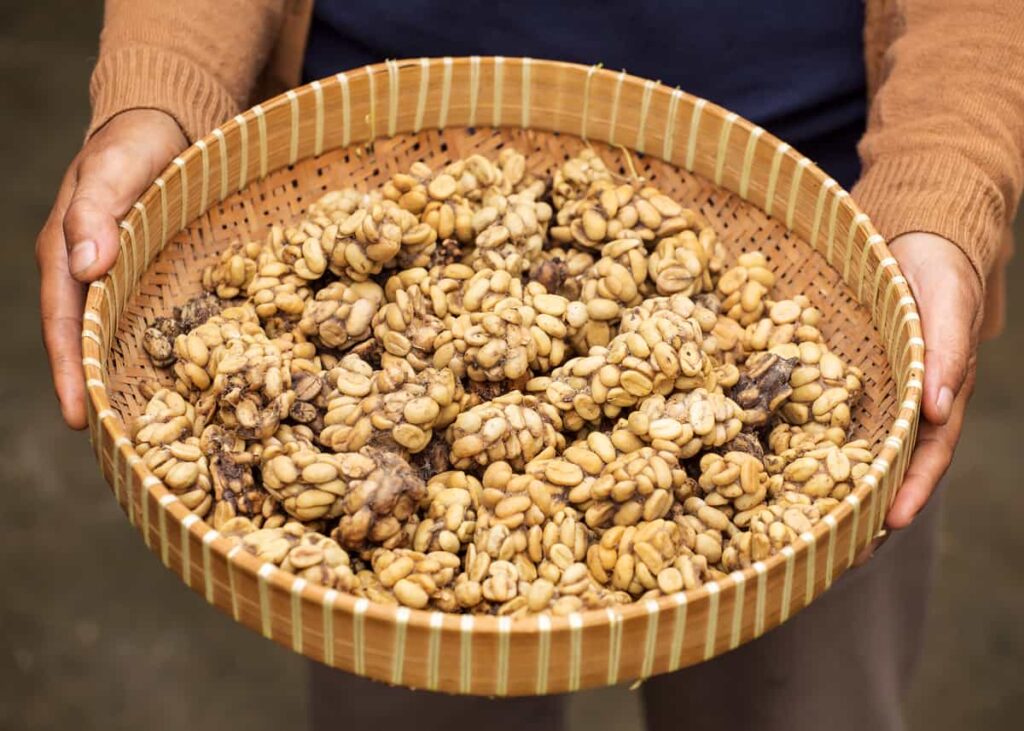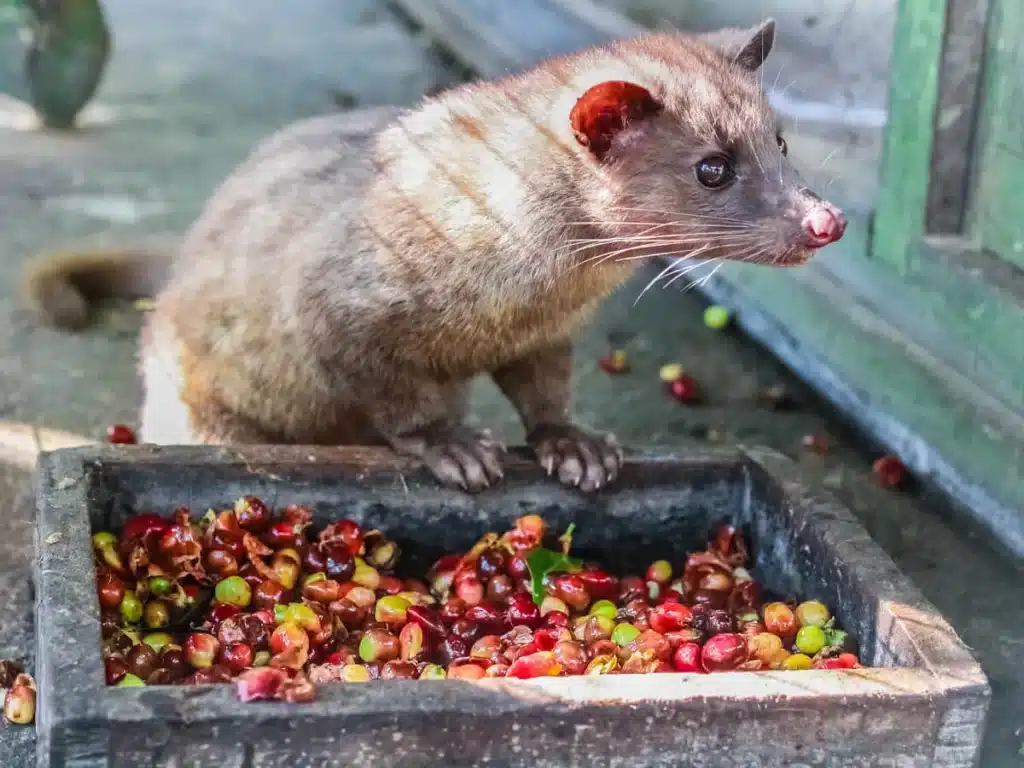Have you ever been reading about coffee types and variations when you suddenly come across a unique name, i.e., Luwak Coffee, AKA Civet Coffee? As much as its name seems to be unique, so is its making process. You might be surprised to hear that these coffee grounds are obtained from a civet (an Indonesian animal). Yes, you heard it right: the civets are known to have partially or completely digested the coffee grounds, and then these grounds are used to make coffee. It turns out that luwak coffee stands as the most expensive coffee beverage in the world due to its rich and deep taste. this article guide will discuss the cultural significance and brewing methods to make this renowned coffee.

History and Origin of Opulent Luwak Coffee
Asian palm civets are an important animal of Southeast Asian tropical forests, which are the source of Luwak Coffee. Farmers first observed these nocturnal animals eating ripe coffee cherries centuries ago, and they started gathering the partially digested coffee beans from the forest floor. Through this method, wild kopi luwak, known for its distinct flavor profile, was discovered. Even though they were thrown out at first, these coffee luwak beans transformed as they digested. The ground coffee gained appeal despite being unusual. In addition to its unique flavor, kopi civet coffee attracted attention due to its unique source. Nonetheless, efforts to guarantee sustainable production methods have been spurred by ethical concerns over the abuse of civets.
Before going deep into the production process, have a look at Aeropress coffee recipes to indulge in a scrumptious delight.

Understand the Production Process of Luwak Coffee
Now, that you know the origins of civet coffee, let’s have a look at the unique extraction method of these coffee grounds.
1. Harvesting
Coffee cherries are collected from the wild or meticulously hand-picked from coffee trees on farms. But in the case of wild civets, the cherries are chosen naturally by the animals.
2. Feeding
Either on licensed farms or in the wild, Asian palm civets are given the collected cherries. Although this might seem out of the ordinary, it is an essential stage in the making of civet coffee, since it facilitates the special fermenting process.
3. Digestion
As the coffee beans move through the civet’s digestive tract, enzymes within the system ferment them. Through this process, regular coffee beans become kopi luwak beans, which are highly valued for their unique flavor.
4. Collection
The beans are removed from the stool by hand in natural settings or by cleaning spaces in civet farms after the civet discharged them. This guarantees that the beans of the highest quality are the only ones picked for further treatment.
5. Cleaning
To get rid of any remaining bits of residue or pollutants, the harvested beans are thoroughly cleaned. This is an important step for maintaining the quality and purity of the coffee luwak.
6. Drying
An essential stage in the cleaning and drying of coffee beans involves laying the cleaned beans out in the sun to dry. Also, adequate drying brings out the flavor of the beans and ensures uniformity in the final product or coffee beans.
7. Sorting
The beans are carefully separated based on look, size, and quality after they have dried. Only the finest coffee luwak beans can make their way into the final product, due to this tedious sifting process.
8. Roasting
To guarantee consistency and quality, the sorted beans are then roasted in small amounts to bring out their unique flavors and smells. In addition, roasting is an essential step towards achieving the civet coffee’s full potential.
9. Grinding
The beans are ground into a fine powder and prepared for brewing after roasting. Grinding the coffee Luwak guarantees that the aromas and flavors are fully released during brewing.
10. Brewing
To create a distinctive and wonderful cup of coffee, hot water is finally used to brew ground Civet Coffee. Yet, to maintain the nuances of the civet coffee, the brewing technique needs to be done with great care.

Potential Benefits of Luwak Coffee
Civet coffee, or luwak coffee, has a number of unique advantages.
1. Luwak Coffee Offers Unique Flavor Profile
It is worth mentioning that civet coffee has a unique flavor profile that is a result of the fermentation process that the coffee beans go through in the civet’s digestive system. This method separates the product from conventional types of coffee by creating a rich, smooth brew with subtle smells. Additionally, Luwak coffee’s flavor profile can often be described as velvety, with undertones of caramel, chocolate, and exotic spices.
2. Luwak Coffee Helps in Lowering Acidity
When compared to other coffee varieties, civet coffee is renowned for having less acidity. Although acidity levels might differ based on factors including brewing method and roast level, many people find Luwak coffee to taste better. Due to its reduced acidity, coffee use can lead to fewer digestive or stomach problems.
3. Exquisite Taste Experience is a Specialty of Luwak Coffee
Civet coffee offers a rich and sumptuous taste experience for those who appreciate fine coffee. It provides a sensory experience unlike any other thanks to its distinct flavor profile and silky texture. In addition, Luwak coffee’s exotic origins and rarity make it an appealing beverage for special occasions.
4. Luwak Coffee Possesses Potential Antioxidant Properties
We can say that civet coffee has antioxidants, just as other varieties of coffee, that help protect the body against harm from free radicals. Regular Luwak coffee use could potentially increase total antioxidant intake. However, it’s crucial to remember that variables like roast level and bean quality might affect how many antioxidants specifically exist in Luwak coffee.
5. Cultural Significance of Luwak Coffee Makes it Special
Last but not least, civet coffee grows in various places where it is valued for its taste and rarity as well as its cultural significance. It is highly sought after in some cultural contexts since it is frequently connected to hospitality and tradition. Also, mastering the art of luwak coffee brewing might improve the taste of this special type of coffee in general.
Although civet coffee has many benefits, it’s of the utmost importance to purchase it from reputable vendors who have a focus on ethical and sustainable production practices.
You can get details on the nutritional benefits of civet coffee in Madhu Savara’s article.

Brewing Methods: Master the Brewing of Luwak Coffee
To properly enjoy the distinct flavor profile of civet coffee, also called kopi luwak, careful consideration to detail must be given when brewing the coffee.
Here are some popular brewing methods:
1. Pour-Over Method for Civet Coffee
To begin, grind the civet coffee beans to a medium-fine ground. Add the ground coffee to a pour-over dripper filter. To ensure that the flavors are uniformly extracted from the grounds, pour boiling water (approximately 200°F) over them in a circular motion. Allow the coffee to slowly drip down into your cup. This technique brings out the nuanced tastes of civet coffee. In addition, mastering the pour-over method for preparing civet coffee gives you exact control over the brewing process.
2. French Press: Popular Brewing Technique for Luwak Coffee
Transfer the coarsely ground civet Kopi coffee beans to the French press. Make sure that the coffee grounds are damp by pouring boiling water over the grinds. After around four minutes, remove the plunger from the French press and replace the cover. Press the plunger slowly to extract the coffee grounds from the brewed coffee. Rich, flavorful, and full-bodied coffee is the result of this process. Although the French press method highlights the unique features of civet coffee, it can result in a slightly thicker taste than other brewing methods.
3. Try Out the Espresso Method for Brewing Luwak Kopi Coffee
Crush the Civet coffee beans into a fine powder that works well for espresso. Warm up your portafilter and espresso maker. Level up the ground coffee in the portafilter by adding it and leveling it out. Extract the shot of espresso by locking the portafilter into the machine. Espresso made from civet coffee typically has strong flavors and a smooth, velvety texture. In addition, brewing Kopi coffee as espresso produces a strong and concentrated cup of coffee.
4. Luwak Coffee using the Cold Brew Method
Transfer the coarsely ground Kopi coffee beans to a big bowl or cold brew machine. Make sure the grounds are completely soaked by smothering them with cold water. For 12 to 24 hours, keep the container covered and allow it to soak in the refrigerator. Strain the coffee once it has steeped to get rid of the grounds. Luwak coffee brewed cold has subtle attributes and is less acidic and smooth. Besides, cold brew is a soothing alternative how to make Luwak coffee, especially in the summer.
Try a variety of brewing techniques and ratios to figure out which one best matches your taste buds and accentuates the distinctive qualities of Kopi coffee.
However, if you want further details on any of these methods, check out this article.
From Bean to Brew: Exploring the Luwak Coffee Cost
When figuring out how much is luwak coffee, one should know that price varies depending upon the variety, production methods, quality, etc. However, we can say that the cost ranges from $100 to $600 per pound.
Conclusion
Summing up, the article covered details on the Luwak Kopi coffee, the most expensive type. Although it is obtained from the feces of civets, it offers numerous benefits over regular coffee. If you are a coffee lover and haven’t tried out this popular beverage, do try it out now.
Wildly Wonderful: Luwak Coffee!



